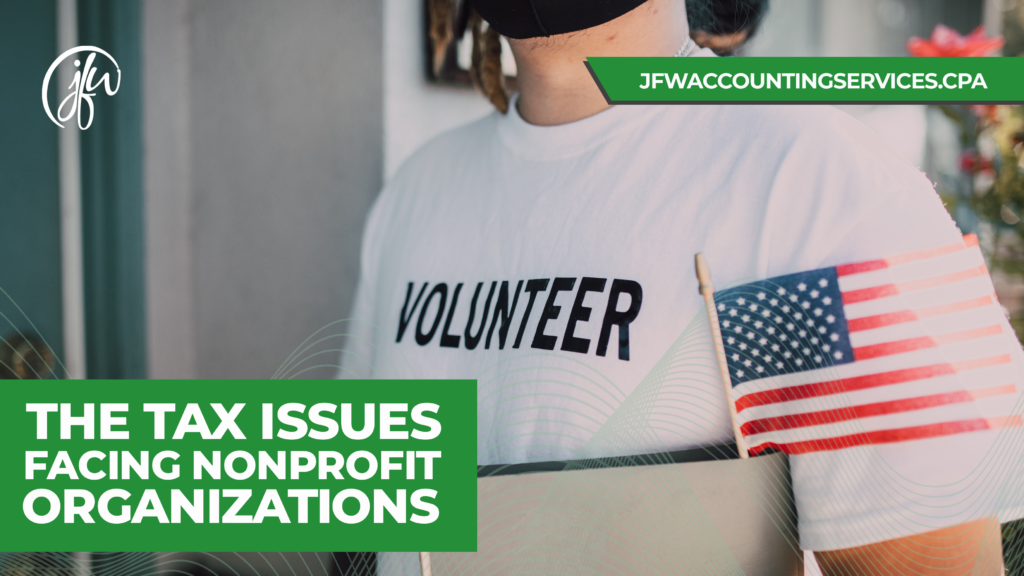Nonprofit organizations must comply with many tax rules and regulations to keep their tax-exempt and nonprofit statuses. Understanding how the Internal Revenue Service (IRS) applies tax regulations to charities, foundations, and other nonprofit organizations can be complicated. Here we break down the basics of some common issues affecting nonprofits, but it is always recommended to discuss relevant tax regulations with an accountant.
Charitable Giving Incentives
Charitable giving incentives come from State and Federal tax laws and encourage businesses and individuals to contribute to nonprofit organizations. Recent tax laws have raised the standard deduction and capped amounts allowed, discouraging individuals from itemizing deductions, and putting strain on nonprofits. However, Congress and nonprofit advocates continue to find positive outcomes through charitable giving incentives and new laws, including the CARES Act, which allows a new itemized deduction.
Disaster Tax Relief (Federal)
Federal regulations for those affected by disasters can be of interest to nonprofits in two ways: they can receive relief when the organization is harmed by a disaster and can receive tax benefits when assisting those impacted by a disaster. The IRS provides relief for nonprofits that miss a filing deadline due to a disaster. Nonprofits that serve those impacted by disasters also receive tax exemptions or deductions but must cautiously document all costs associated with disaster relief. Guidance on how to document relief activities can be found on the IRS website.
Estate Tax (Federal)
The Federal Estate Tax is a tax collected by the government on the estates people leave behind when they pass away. As the taxable amount of the estate is calculated, there are deductions allowed for mortgages, passing property to surviving spouses, and charitable donations. It encourages people to arrange to donate to nonprofit organizations when planning for their estates.
Unrelated Business Income Taxes (UBIT)
UBIT is income earned in a trade or business through an activity that is regularly carried on is not substantially related to the purpose of the organization. Income earned by a nonprofit that is considered unrelated must be declared to the IRS and the organization must pay unrelated business income taxes on that revenue. Some common unrelated business income taxes include:
- Tax on Nonprofit Transportation Benefits
- Tax on “Separate” “Trade or Business”
- Tax on Rental Income from owned Real Estate
- Investment Income
Nonprofit Nonpartisanship (Johnson Amendment)
The Johnson Amendment was passed in 1954 and prevents nonprofits from engaging in political partisan activities, like endorsing candidates. The amendment achieved barring partisan activities but made it possible for nonprofit organizations to advocate for policies that help their cause. It is important because it allows people to get support or become a member of a nonprofit without having to worry about their own political affiliation. Nonprofit nonpartisanship helps nonprofits continue to serve their community and protects their reputation.
Taxes, Fees, and PILOTs (Payments in Lieu of Taxes) (State)
Most states acknowledge that nonprofit organizations are exempt from paying property taxes on all or some of the real estate owned by the organization. However, state laws find ways around the exemption and impose taxes and fees on the nonprofits, in the means of voluntary payments. These Payments in Lieu of Taxes (PILOTs) are imposed on nonprofits to increase their tax liability and can be costly to a nonprofit whose intentions are to fund its mission. The fees and taxes are encouraged, but not required in some states, while others have found a way to require them.
Volunteer Mileage Rate (Federal)
The standard mileage rate is provided each year by the IRS to allow individuals that drive for work purposes to receive deductions based on mileage, rather than detailed expenses like gas and repairs. The standard mileage rate for 2022 is 58.5 cents per mile, which was increased from the previous year. However, that rate does not apply to volunteers that drive as part of their contribution to a nonprofit. The volunteer mileage rate in 2022 is only 14 cents per mile, which has not been increased in more than ten years. That means that if volunteers for nonprofit organizations receive any mileage reimbursement above 14 cents per mile, that income is taxable.
Filing Requirements for Nonprofits (Federal)
While many nonprofits are tax-exempt, there are still some filing requirements set by federal laws. Nonprofits that are not designated tax-exempt must file and pay taxes as a corporation. Organizations that have obtained tax-exempt status must file an annual report, Form 990, to maintain that status. Some nonprofits, like churches, receive their tax-exempt status automatically and are exempt from having to file any annual returns. It is important that a nonprofit check state regulations where their organization operates and seeks clarification for federal and state requirements from an accountant.
Revocation of Tax Exemption (Federal)
Failing to file a Form 990 with the IRS can result in a nonprofit’s tax-exempt status being revoked. Organizations can confirm that their status is intact on the IRS website. However, if a nonprofit has had their tax exemption revoked, they will be liable for federal income tax as well as any of the following consequences:
- Back Taxes if the revocation was in a previous year
- Revocation of state exemptions
- Ineligibility of donors to receive tax deductions on contributions
- Loss of grant eligibility
What To Do Next
Tax issues can be overwhelming for any business, including nonprofit organizations. Navigating through applicable exemptions, deductions, and fees should be done with the assistance of an expert. At JFW Accounting Services, we can help to understand and comply with relevant tax issues so your focus can stay on your mission. To speak with us today, click here.

Jo-Anne Williams Barnes, is a Certified Public Accountant (CPA) and Chartered Global Management Accountant (CGMA) holding a Master’s of Science in Accounting (MSA) and a Master’s in Business Administration (MBA). Additionally, she holds a Bachelor of Science (BS) in Accounting from the University of Baltimore and is a seasoned accounting professional with several years of experience in the field of managing financial records for non-profits, small, medium, and large businesses. Jo-Anne is a certified Sage Intacct Accounting and Implementation Specialist, a certified QuickBooks ProAdvisor, an AICPA Not-for-Profit Certificate II holder, and Standard for Excellence Licensed Consultant. Additionally, Jo-Anne is a member of American Institute of Certified Public Accountant (AICPA), Maryland Association of Certified Public Accountants (MACPA), and Greater Washington Society of Certified Public Accountants (GWSCPA) where she continues to keep abreast on the latest industry trends and changes.

